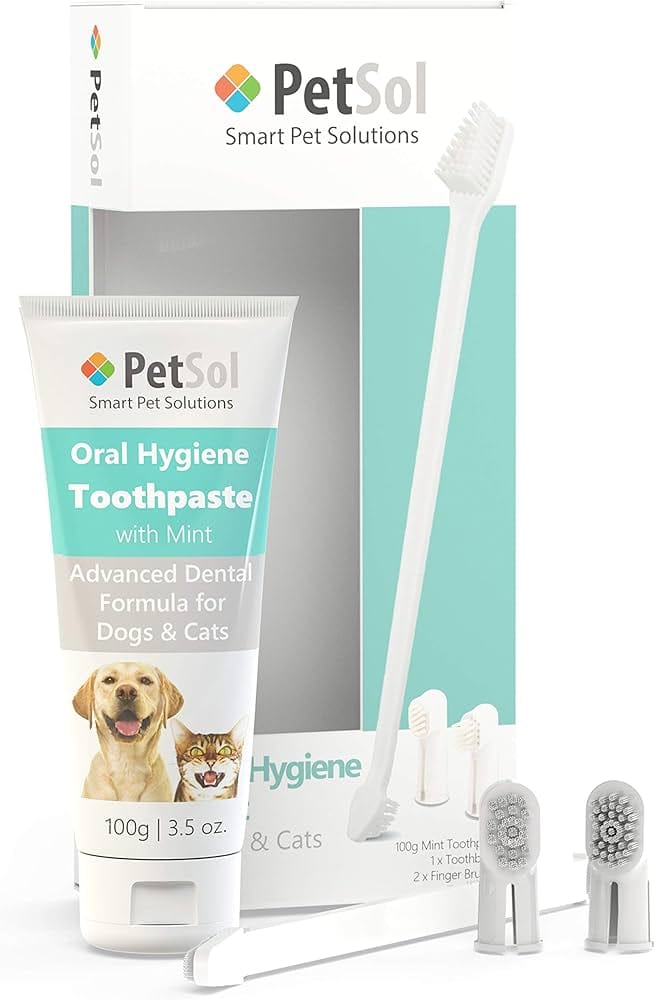Maintaining your pet’s dental health is a cornerstone of their overall well-being. Just as humans are susceptible to plaque, tartar, and gum disease, so too are dogs and cats. Left untreated, these issues can escalate into significant health complications. Utilizing a pet-specific toothpaste is paramount for ensuring your furry companion enjoys a healthy and happy smile. This comprehensive guide will review the top toothpastes available for dogs and cats, elucidate the dangers of using human toothpaste on pets, and offer expert advice to transform teeth brushing into a simple and stress-free routine. If you’re seeking expert guidance on pet dental care in Dwight, IL, Dwight Veterinary Clinic is dedicated to assisting you.
The Crucial Importance of Pet-Specific Toothpaste
Why Human Toothpaste Poses a Risk to Pets
Human toothpaste formulations often contain fluoride and xylitol, both of which are highly toxic to dogs and cats. In contrast, pet-safe toothpastes are designed to be harmless if accidentally ingested and are available in appealing flavors such as poultry, beef, or vanilla, making the experience more enjoyable for your pet.
Benefits of Regular Dental Brushing for Pets
- Reduces Plaque and Tartar: Consistent brushing effectively combats the buildup of plaque and tartar, common culprits of dental disease.
- Prevents Bad Breath: Eliminates the bacteria responsible for halitosis, keeping your pet’s breath fresh.
- Lowers Risk of Gum Disease and Tooth Loss: Proactively prevents gingivitis and periodontal disease, safeguarding your pet’s teeth and gums.
- Supports Overall Health: By reducing oral bacteria, regular brushing helps prevent systemic issues that can affect the heart, kidneys, and other vital organs.
Top Toothpaste Recommendations for Dogs and Cats
1. Virbac C.E.T. Enzymatic Pet Toothpaste
- Suitability: Safe for both dogs and cats.
- Available Flavors: Poultry or vanilla.
- Key Benefits: Clinically verified to reduce plaque and tartar accumulation; formulated to be safe when swallowed.
- Veterinarian Recommendation: A highly trusted product among veterinarians due to its proven efficacy and safety profile.
2. Sentry Petrodex Enzymatic Dog Toothpaste
- Suitability: Specifically for dogs.
- Available Flavors: Poultry.
- Key Benefits: Features an enzymatic formula that actively fights plaque and gingivitis; a common recommendation in veterinary practices.
- Veterinarian Recommendation: Praised for its affordability and widespread use by veterinary professionals.
3. Vet’s Best Enzymatic Dog Toothpaste
- Suitability: Designed for dogs.
- Available Flavors: Natural poultry flavor.
- Key Benefits: Utilizes a blend of natural ingredients including aloe, neem oil, and enzymes to effectively clean teeth.
- Veterinarian Recommendation: An excellent choice for pet owners who prefer natural dental care solutions.
4. Petsmile Professional Dog Toothpaste
- Suitability: Specifically formulated for dogs.
- Available Flavors: Poultry.
- Key Benefits: Fluoride-free, safe for ingestion, and effective in reducing plaque and tartar. This toothpaste is approved by the American Veterinary Dental College (AVDC).
- Veterinarian Recommendation: Highly regarded by veterinary professionals and recognized by the AVDC for its quality and effectiveness.
5. Vet’s Best Enzymatic Cat Toothpaste
- Suitability: Specifically formulated for cats.
- Available Flavors: Seafood or poultry.
- Key Benefits: Offers a gentle yet effective cleaning action, helping to reduce tartar buildup while being safe for feline consumption.
- Veterinarian Recommendation: Uniquely formulated for cats, acknowledging their particular sensitivities, especially when it comes to brushing.
Expert Tips for Successful Pet Teeth Brushing
- Introduce Gradually: Begin by letting your pet sample the toothpaste to acclimate them to the taste, followed by introducing them to the toothbrush.
- Use Pet-Appropriate Brushes: Opt for soft-bristled toothbrushes or finger brushes, which can make the brushing process more manageable and comfortable for your pet.
- Proper Brushing Technique: Hold the brush at a 45-degree angle to the gum line and use gentle, circular motions.
- Keep Sessions Brief: Aim for 2–3 minutes per session. Consistency in brushing is more impactful than the duration of each session.
- Positive Reinforcement: Offer treats or affectionate praise immediately after brushing. This helps create positive associations with the dental hygiene routine.
If you reside in Dwight, IL, and are seeking expert guidance for your pet’s dental care, Dwight Veterinary Clinic offers professional services designed to maintain your beloved companion’s teeth, ensuring they remain healthy, bright, and strong.
Frequently Asked Questions About Pet Dental Health
1. Can human toothpaste be used on dogs or cats?
Absolutely not. Human toothpaste contains toxic ingredients like fluoride and xylitol. Always use toothpaste specifically formulated for pets.
2. What is the recommended frequency for brushing my pet’s teeth?
Daily brushing is ideal for optimal dental health. If daily brushing is unfeasible, aim for at least 2–3 times per week.
3. Are dental chews sufficient for maintaining my pet’s teeth?
While dental chews can contribute to oral hygiene, they are not a substitute for regular brushing. Brushing remains the most effective method for cleaning your pet’s teeth.
4. What should I do if my pet strongly dislikes having their teeth brushed?
Start the process slowly, introduce flavored toothpaste, and consider using finger brushes. Employ positive reinforcement techniques to build positive associations.
5. When is a professional dental cleaning necessary for my pet?
Most pets benefit from an annual dental checkup and cleaning. However, the frequency may vary based on your pet’s individual oral health needs.
6. Can dental problems impact my pet’s overall health?
Yes. Neglected dental issues can contribute to serious health problems affecting the heart, kidneys, and liver. Regular brushing and veterinary checkups are essential preventative measures.

